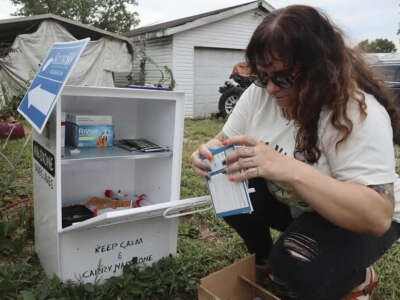The GOP’s proposed cuts to Medicaid could take away an important lifeline in the effort to combat violence. Despite significant reductions in violent crime since the pandemic, violence and the fear of violence remain a stubborn feature of daily life in too many communities across the U.S. A new strategy of using Medicaid funding to support community-based trauma counseling to reduce violence has growing support at the state level, but the Republican budget bill that passed the house would cut more than $800 billion in Medicaid funding over the next 10 years — and most likely close the door on this essential tool.
As experts on public safety, we have seen firsthand the importance of childhood trauma in driving violence. At Newark’s HUBB Arts and Trauma Center (HUBB ATC) we see every day the struggles of young people to overcome trauma in their daily lives and to take the difficult steps needed to break the cycle of violence.
Both of us experienced untreated childhood traumas and understand the need for services tailored to young people’s experiences. At 15, Alex Vitale was stabbed by a home intruder. While the police and an ambulance arrived quickly and a report was taken and medical care given, no efforts were made to provide follow up mental health care. For years, he suffered from anxiety and slept with a weapon next to his bed.
As a child, Al-Tariq Best endured a range of traumatic experiences, including domestic violence, murder, drug exposure, and sexual abuse. He witnessed firsthand the physical abuse his mother suffered at the hands of her partners. After his mother made the difficult decision to leave and eventually divorce his father, they became entangled with another abusive man who inflicted relentless physical, emotional, and psychological abuse upon the family.
Growing up in this chaos fostered a dangerous normalization of abuse, contributing to their own emotional insecurities and distorted perceptions of relationships. As they matured into adulthood, this unresolved trauma often manifested as anger and unhealthy dynamics in their own relationships.
Research into violent crime has shown that past trauma plays a major role in predicting future violence, especially among young people. When people are exposed to or directly experience traumatic events such as suffering domestic violence, witnessing a shooting, or even regularly hearing about the violent deaths of friends and family members, it can lead to forms of post-traumatic stress, similar to that seen in combat veterans. This stress can lead to irritability, interrupted sleep, inability to concentrate, and heightened levels of fear and anxiety, all of which are associated with higher risk of involvement in violence.
Children are especially susceptible to this dynamic. Children are more likely to live in extreme poverty and be exposed to domestic abuse and community violence. Over 20 percent of children in the U.S. grow up in poverty, and youth violence is heavily concentrated within exactly this population. At the same time, they are less well equipped to manage this trauma because they are still developing emotionally and intellectually, making them more likely to engage in impulsive and poorly thought-out behavior. This contributes not just to higher levels of violence but also to suicides and harmful substance use.
Over the last decade, new efforts have emerged to address trauma at the community level as part of an overall strategy to reduce community violence. Trauma recovery centers (TRCs) have been created across the U.S. that put clinical mental health workers in community-based settings to engage with people who have suffered trauma. The National Alliance of Trauma Recovery Centers reports that there are 59 such centers in 15 states that attempt to overcome the stigma too often associated with receiving mental health services.
In New Jersey, Newark Community Street Team, a community-based violence reduction program created in 2014, opened its Trauma Recovery Center in 2020 and serves people who have experienced a broad range of traumas at no cost. The Grady TRC in Atlanta is based at a local hospital and helps people who have been the victims of violence get their lives back on track through medical services, psychological therapy, and essential social services that often harness victim services resources. The Downtown Women’s Center operated by UC San Francisco in Los Angeles specializes in assisting women victims of violence in English and Spanish, regardless of immigration status.
Several states have attempted to support this work by authorizing TRCs to bill Medicaid for the delivery of these essential health services. Medicaid provides medical coverage for the poor and disabled through grants to states, which then decide how best to spend the money within federal guidelines. Medicaid is an essential source of revenue for funding hospitals and clinics in poor and underserved communities. California, Oregon, Connecticut, New York, Maryland, and Illinois have all passed laws enabling TRCs to receive Medicaid reimbursements for their work. This has allowed for a significant expansion of services in these states as part of the effort to break the cycle of violence.
While some existing TRCs in the U.S. serve children, many do not, and none exclusively serve youth. The HUBB ATC that Al-Tariq Best founded wants to change that. It has served young people in Newark at high risk of involvement in violence since 2013 by utilizing a mixture of arts programing, mentoring, social services, and mental health support to stabilize young people in crisis. The HUBB ATC is part of a citywide effort to build community capacity to stop violence outside the traditional use of police, courts, and prisons. Together, these groups have helped drive down violent crime in Newark to historic lows.
While The HUBB ATC has long employed licensed mental health workers to help young people in crisis, the need is much greater than the current capacity. Over the last few years, the organization has received grants and in-kind donations to build out a multifaceted youth trauma center that would allow for both situational and intensive long-term therapeutic interventions.
Unfortunately, operational funding has failed to materialize. New Jersey has been considering a bill to allow the use of Medicaid reimbursements, but that bill is likely to be moot given the massive cuts to Medicaid contained in the GOP budget bill. The proposed $800 billion reduction would make expansion in Medicaid coverage highly unlikely since states will be under huge pressure to make up for the forthcoming shortfalls.
Hopefully the Senate will take steps to block the Medicaid cuts and New Jersey and other states can move forward with this essential service that will both improve the mental health of young people and help reduce violence. Otherwise, it will be up to local and state governments as well as philanthropy to try and make up the difference. The evidence is clear that youth violence is a public health issue that is best dealt with through community-centered behavioral health interventions and social services, not more intensive policing and mass incarceration.
Help Truthout resist the new McCarthyism
The Trump administration is cracking down on political dissent. Under pressure from an array of McCarthy-style tactics, academics, activists and nonprofits face significant threats for speaking out or organizing in resistance.
Truthout is appealing for your support to weather this storm of censorship. We fell short of our goals in our recent fundraiser, and we must ask for your help. Will you make a one-time or monthly donation?
As independent media with no corporate backing or billionaire ownership, Truthout is uniquely able to push back against the right-wing narrative and expose the shocking extent of political repression under the new McCarthyism. We’re committed to doing this work, but we’re also deeply vulnerable to Trump’s attacks.
Your support will help us continue our nonprofit movement journalism in the face of right-wing authoritarianism. Please make a tax-deductible donation today.
Read full article at source
Stay informed about this story by subscribing to our regular Newsletter


